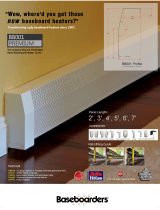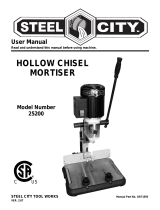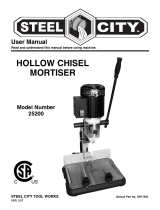
EXPLODED VIEW & PARTS LIST
19
No. Part No. Description Qty.
1 43012-001 Flat Washer 10mm 4
2 43012-002 Hex Bolt M10-1.5 X 30 2
3 43012-003 Base 1
4 43012-004 Flat Head Cap Screw M6-1 X 12 2
6 43012-006 Fence 1
7 43012-007 Fence Rod 1
8 43012-008 Fence Collar 1
9 43012-009
Compression Spring
33 X 80mm
1
10 43012-010 Micro-Adjustment Plate 1
11 43012-011
Micro-Adjustment Knob
M8-1.25 X 65
1
12 43012-012 Cap Screw M8-1.25 X 20 2
13 43012-013 Set Screw M5-.8 X 8 2
14 43012-014 Guide Block 1
15 43012-015
Fence Lock Knob
M8-1.25 X 25
1
16 43012-016
Hold-down Clamp Lock Knob
M16-2 X 25
1
17 43012-017 Hold-down Clamp Bracket 1
18 43012-018 Hold-Down Rod 1
20 43012-020 Chuck Access Cover, Plastic 2
21 43012-021 Hex Nut M12-1.75 1
22 43012-022 Fender Washer 12mm 1
23 43012-023
Compression Spring
25 X 28mm
1
24 43012-024 Fender Washer 20mm 1
25 43012-025 Tool Holder 1
26 43012-026 Cap Screw M6-1 X 15 2
27 43012-027 Power Cord 18G 3W 72” 5-15P 2
28 43012-028 Handle Sleeve 1
29 43012-029 Motor 1
29-1 43012-029-1 Motor Fan Cover 1
29-2 43012-029-2 Ball Bearing 6202Zz 1
29-3 43012-029-3 Ball Bearing 6203Zz 1
29-4 43012-029-4 Motor Fan 1
29-5 43012-029-5 Contact Plate 1
29-6 43012-029-6
R Capacitor 14M 250V
1-3/8 X 2-1/2
1
29-7 43012-029-7 Switch 1
30 43012-030 Hex Bolt M10-1.5 X 25 2
31 43012-031 Lock Washer 10mm 4
32 43012-032 Step Plate 1
33 43012-033 Operation Handle 1
34 43012-034 Gear 34T 1
35 43012-035 Roll Pin 8 X 35 1
36 43012-036 Pinion 1
37 43012-037 Plastic Cover 1
38 43012-038
Compression Spring
19 X 28mm
1
No. Part No. Description Qty.
39 43012-039
Shoulder Screw
M10-1.5 40, 26 X 40
1
40 43012-040 Handle Clutch 1
41 43012-041 Gear Column 1
42 43012-042 Guide Column 1
43 43012-043 Depth Lock Collar 1
44 43012-044
Depth Lock Knob
M8-1.25 X 18
1
45 43012-045 Table 1
46 43012-046
Phillips Head Screw
M8-1.25 X 20
2
48 43012-048 Chisel Bushing 3/4” 1
49 43012-049
Drill Chuck
B16 1.5-13mm
2
49-1 43012-049-1
Drill Chuck Key
1/4” Se 12T Sd-1/2”
1
50 43012-050 Cap Screw M8-1.25 X 45 1
51 43012-051 Cap Screw M6-1 X 20 1
52 43012-052 Gear Shaft 1
53 43012-053 Headstock 1
54 43012-054 Cap Screw M8-1.25 X 25 4
55 43012-055 Flat Washer 8mm 4
56 43012-056
Oversized Flat Washer
6 X 3.5mm
1
57 43012-057 Motor Junction Box 1
58 43012-058 Phillips Head Screw M3-.5 X 14 4
59 43012-059 Switch Plate 1
60 43012-060 Phillips Head Screw M4-.7 X 12 2
61 43012-061 Cap Screw M6-1 X 16 1
63 43012-063 Gas Spring 38mm 1
63-1 43012-063-1 Ball Stud 12-1.75 2
65 43012-065 Circuit Breaker 6A 1
66 43012-066 Chip Guard 1
68 43012-068 Hex Nut M8-1.25 2
69 43012-069 Roll Pin 4 X 30 1
70 43012-070
Strain Relief M16-2 X 15 St
Plastic
1
71 43012-071 Lock Washer 6mm 1
73 43012-073 Lock Washer 8mm 2
74 43012-074 Power Switch 1
75 43012-075 Hex Wrench 6mm 1
77 43012-077 Flat Washer 6mm 2
78 43012-078 Roll Pin 5 X 35 1
79 43012-079 Hex Wrench 5mm 1
80 43012-080 Hex Wrench 3mm 1
81 43012-081 Mortising Chisel 1/2" 1
82 43012-082 Mortising Chisel 3/8" 1
83 43012-083 Mortising Chisel 1/4" 1
84 43012-084
Drill Chuck Arbor
Mt#2 X B16
1























